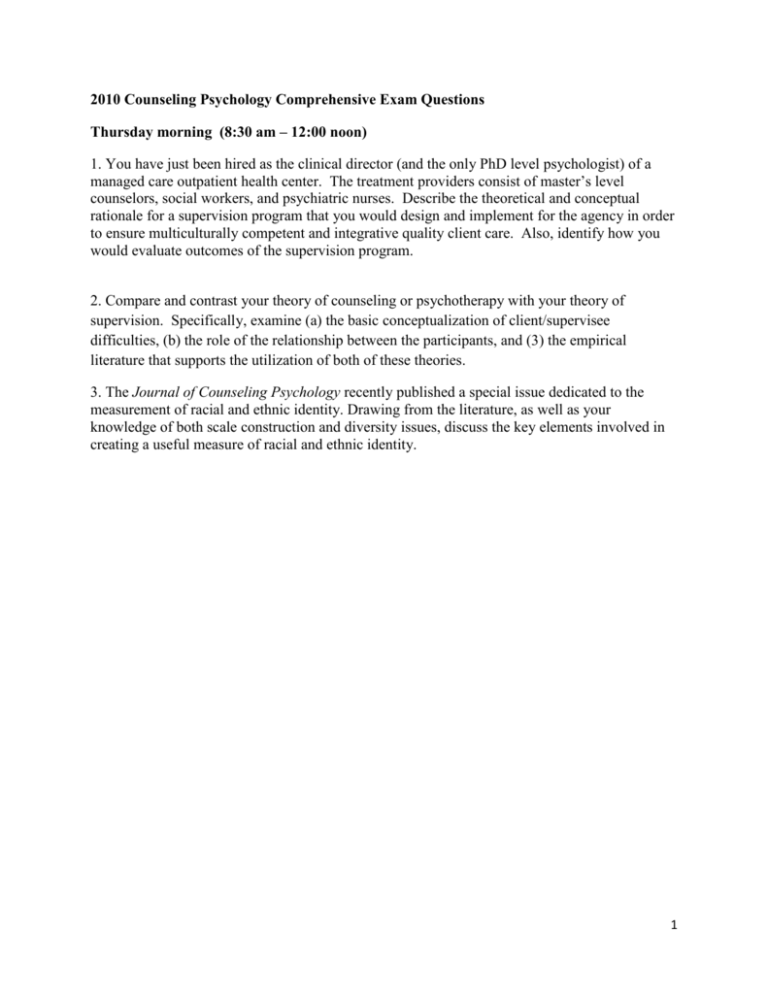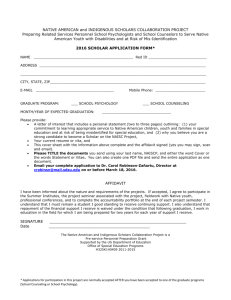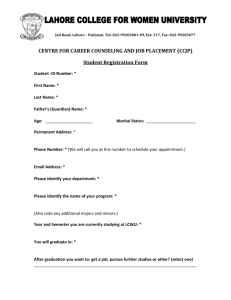THEORY
advertisement

2010 Counseling Psychology Comprehensive Exam Questions Thursday morning (8:30 am – 12:00 noon) 1. You have just been hired as the clinical director (and the only PhD level psychologist) of a managed care outpatient health center. The treatment providers consist of master’s level counselors, social workers, and psychiatric nurses. Describe the theoretical and conceptual rationale for a supervision program that you would design and implement for the agency in order to ensure multiculturally competent and integrative quality client care. Also, identify how you would evaluate outcomes of the supervision program. 2. Compare and contrast your theory of counseling or psychotherapy with your theory of supervision. Specifically, examine (a) the basic conceptualization of client/supervisee difficulties, (b) the role of the relationship between the participants, and (3) the empirical literature that supports the utilization of both of these theories. 3. The Journal of Counseling Psychology recently published a special issue dedicated to the measurement of racial and ethnic identity. Drawing from the literature, as well as your knowledge of both scale construction and diversity issues, discuss the key elements involved in creating a useful measure of racial and ethnic identity. 1 Thursday afternoon (1:00pm – 4:30 pm) 4. A natural scientist is not embarrassed because he cannot look at a tree and predict which leaves will fall first in the autumn or the exact path of the fall or where the leaf will land. Maybe individual lives are a lot like leaves; perhaps there is a very limited amount one can say about the individual case, based on a knowledge of leaves in general or people in general, without detailed, idiographic study of that particular case and even then it is hard to know how the winds will blow from one day to the next. (Lykken, 1991; pp. 18-19) Underlying the continued qualitative versus quantitative research design controversy are significant differences in philosophical perspectives. Discuss the above quote by Lykken based on your understanding of those perspectives considering both areas of divergence and possibilities for convergence of these views. 5. Kazdin (2008) explains in a relatively recent article in the American Psychologist that there is a well-recognized split within psychology between research and practice in professional work, career paths, and training. The Journal of Counseling Psychology and The Counseling Psychologist are journals that are highly valued in your training as a Counseling Psychologist. Generally speaking, do the research studies described in these two journals translate well into practice (i.e., can they easily be used to inform practice)? Pick one empirical study you read in either JCP or TCP and describe both the methodology and most important findings. Then provide specific methodological alterations that could improve the study’s clinical relevance. 6. The DSM can be best described as an atheoretical description of specific psychological disorders. Current efforts are in progress to revise the DSM and the American Psychiatric Association has been soliciting feedback regarding the revision. Integrating the literature relevant to counseling psychology, what feedback would you provide the American Psychiatric Association? In other words, what types of revisions do you think are necessary in order to make the DSM more useful to the practice of counseling psychology? 2 Friday morning (8:30 am – 12:00 noon) 7. You are working with a Mexican American client, Raquel, who is a successful undergraduate junior. Raquel wonders about the degree to which her parents [and extended family] will be supportive of her desire to go to medical school. Raquel also has her own mixed feelings about continuing her education; in particular, she is conflicted about her desire to attend medical school while at the same time wanting to get married to her boyfriend and to meet her obligations/responsibilities to her family. Integrating the literature on multicultural counseling, feminist theory, and counseling psychology, how might you proceed with this client? What barriers do you anticipate during counseling and how might you address these stumbling blocks if they occur? 8. It has been demonstrated repeatedly by masculinity researchers that several key aspects of traditional counseling and psychotherapy (e.g., the expectations that clients ask for help, be vulnerable and emotionally expressive) are antithetical to traditional notions of masculinity in the dominant U.S. culture. Such being the case, describe a truly multiculturally sensitive approach to working with traditional men in counseling and psychotherapy, incorporating relevant literature on men and masculinity to support the use of your approach. 9. Social justice has been a recent major focus area within the field. Referencing the literature in the field, what do you understand by the term “social justice” and what does it entail? What would a socially just society look like according to you? What changes would be required socially/systemically to achieve it, and what role can counseling psychologists play? 3 Friday afternoon (1:00pm – 4:30 pm) 10. Theoretical integration has been somewhat controversial. Some believe it leads to effective work with clients, whereas others feel therapists who use it do not have a clear grounding in theory. Take a position regarding theoretical integration and defend it (using a variety of literature bases). 11. Consider the following true statements: 1.) Psychologists continue to lobby for recognition as a profession which can legitimately prescribe medication. 2.) There is an increasing literature about the overuse of psychotropic medications. Given the above, take a position on prescribing of medications by psychologists, supporting your answer with literature. 12. The involvement of psychologists in detainee interrogations has been a source of recent controversy within APA. Given that the vast majority of psychologists will never be involved personally with military interrogations, why is this issue relevant to the field of psychology? 4








